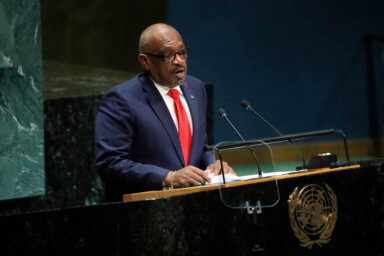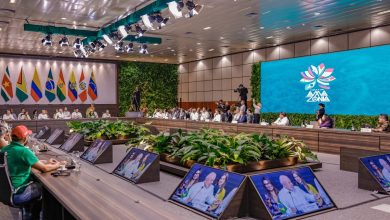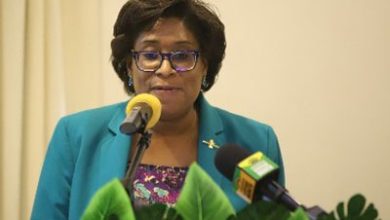Caribbean RoundUp

Antigua and Barbuda
Less than a day after Antigua opposition legislator Anthony Smith submitted his resignation from the main opposition United Progressive Party (UPP), he has been sworn in as the new minister of agriculture, lands, fisheries and the blue economy.
Smith had resigned from the UPP claiming it was due to “a misalignment of values that cannot be reconciled.”
Last Tuesday, he took the oath of office before governor general Sir Rodney Williams and witnessed by prime minister Gaston Browne and members of his cabinet.
Smith had said that he would remain as an independent legislator in the 17-member House of Assembly, but his decision to accept a cabinet position means that the ruling Antigua Labour Party (ALP) which won nine seats in the January 2023 election, can now count on his vote.
In a letter addressed to UPP, General Secretary, Shawn Nicholas Smith, the parliamentary representative for the All Saints West constituency, said over recent months, he had found himself “increasingly at odds with the direction and decisions” of the UPP, adding “my core values and principles, which include transparency, integrity and a steadfast commitment to the public good, have conflicted with actions, directions and policies endorsed by the party leadership.”
“Despite my best ef- forts to address these concerns internally, I have come to the realization that my continued membership of the party compromises my abilities to serve my constituency and up-hold my ethical standards.”
Bahamas
Bahamas prime minister Phillip Davis recently said he was supporting a compendium of bills to legalise the use of cannabis for medical and religious purposes, to decriminalise the possession of small amounts of cannabis.
Speaking in parliament, Davis said he was also supporting the measures to regulate the cultivation, sale and use of cannabis and related products within the borders of the country and to promote the health and safety of our people.
Davis told legislators that for years, Bahamians had called for an administration to have the courage to step up and take this issue on in a decisive and responsible manner.
“While many other countries, including nations within our region like Jamaica, TT, Antigua and Barbuda and Barbados, have taken steps toward decriminalisation and legalisation for medical use, Bahamians were left wondering when it would be our turn to modernise our local approach to cannabis.”
He said that the national dialogue had been ongoing for the better part of a decade and that many people thought change was imminent when the Marijuana Commission began its work in October 2018.
Davis said those efforts culminated in a preliminary report delivered in January 2020 and a final report delivered in August 2021.
He said the commission cited a wide range of in-person discussions and public opinion research, noting that there appeared to be widespread public support for the legalisation of cannabis for medical purposes.
Dominica
Dominica Prime Minister, Roosevelt Skerrit has said that CARICOM governments have discussed the issue of campaign financing even as he acknowledged that the matter was “not a straight forward situation.”
Opposition parties in Dominica have been calling for campaign finance reform as part of the overall electoral reform in Dominica, boycotting the last general election in 2022.
“Now the issue of campaign financing, in principle we support it. But when that was discussed at the CARICOM level and the OECS (Organisation of Eastern Caribbean States) level…there was a view by the heads of government in CARICOM, look, this is a matter that should be dealt with from a regional standpoint because of the complexity of it.”
“They were of the view that this should be handled at a regional level. As a matter of fact there was even a view that we should engage on further consultations on this and to see what type of uniform legislation that we can bring to the table for consideration by the CARICOM heads of government on the issue of campaign finance.”
Skerrit described the issue as a “very complex” one, adding “it is not a straight forward stuff.
“Those who are not involved in politics believe it is straight forward, but it is not straight forward. This is why even in the United States where you have such legislation, it gives …the candidates the opportunity to opt out of that arrangement and they are allowed to raise as much money as they wish to.
“So we are not opposed to it in principle. But what we are saying is that, one, that was never part of the original consideration that where electoral reform is concerned and secondly that would not affect the fundamental points that were raised and are addressed in the bill before the country now,” Skerrit said, adding “but at next rounds of discus- sion we can look at it, likewise amendments to the constitution.”
Haiti
A second contingent of 200 police officers from Kenya arrived in Haiti recently to strengthen the UN backed mission led by the East African country to battle violent gangs in the troubled Caribbean country.
The officers arrived almost one month after the first contingent of 200 landed in the capital of Port-au-Prince, where gangs control at least 80 percent of the city.
Authorities have declined to provide details on the Kenyans’ assignments, citing security concerns, although Associated Press journalists have seen them on patrol in areas near the main international airport, which reopened in late May after gang violence forced it to close for nearly three months.
More Kenyans are expected to arrive in coming weeks and months and will be joined by police and soldiers from the Bahamas, Bangladesh, Barbados, Benin, Chad and Jamaica for a total of 2,500 personnel.
They will be deployed in phases at a cost of some $600 million a year, according to the UN Security Council.
While some Haitians have welcomed the arrival of the Kenyans, others remain wary.
“The fear of the Haitians is that this mission, as has occurred in the past … will only achieve a temporary reduction in violence,” said Diego Da Rin, with the International Crisis Group, who was recently in Haiti.
Jamaica
Prime Minister of Jamaica, Andrew Holness says the government will be accelerating its Hurricane Beryl response very soon.
Holness said the Jamaica Defence Force and the various ministries would be working together to ensure synergy so that Jamaicans, especially those who were worst affected by the hurricane, are properly served.
The prime minister said while he had seen an improvement in the distribution of relief packages by the Ministry of Labour and Social Security in the affected areas, people were still frustrated by the lack of water and electricity.
“Persons are frustrated about their water, they are frustrated about their electricity, and we are working double time to restore that. I know some areas in St. Elizabeth have got back electricity, I have gotten a few calls to say thank you, we have got back our electricity, but not enough. I am not here saying that the problem is solved, but I am here saying that the problem is being worked on and we are seeing results,” he said.
St. Vincent and the Grenadines
St. Vincent’s parliament recently approved an EC$136.4 million (EC$1=US$0.37 cents) package in response to Hurricane Beryl, which left six people dead and hundreds of millions of dollars in damage when it made landfall in the Grenadines on July 1.
The fiscal package is in addition to the EC$1.6 billion budget lawmakers approved in January.
Minister of Finance, Camillo Gonsalves, who tabled the supplementary package, noted that it comes two and a half weeks after the natural disaster and exceeded the EC$117 million Parliament had approved after the April 2021 explosive eruption of La Soufriere volcano.
He said the major initiatives include an EC$23 million subvention to BRAGSA to clean up debris and six million EC dollars for road cleaning.
The finance minister has allocated EC$40 million for construction, including the purchase of building materials, the construction of homes, the purchasing of land and construction aggregate.
He said this includes EC$10 million to build houses, EC$12.5 million for building materials, $1.9 million for aggregate, and two million dollars to buy land.
Gonsalves said this allocation would not be enough, adding that the Barbados-based Caribbean Disaster Emergency Management Agency (CDEMA) has estimated that EC$335 million is needed for housing.
He said another major portion of the supplementary budget is EC$12 million in income support to fishers and farmers and that based on initial analyses.
He said international organisations and the World Bank are also discussing offering income support.
The government has allocated a further EC$8 million of income support to other people who are impacted, primarily those in the hospitality sector.
He said the government had also allocated EC$2 million to improve its Caribbean Catastrophic Risk Insurance Facility (CCRIF) protection.
— Compiled by Devika Ragoonanan




